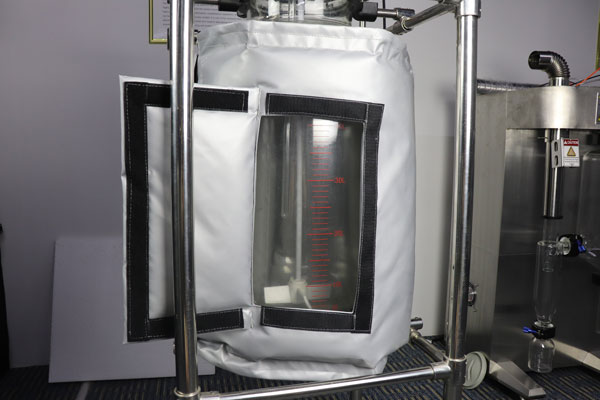A glass reactor system is a crucial tool in chemical laboratories and industrial settings for conducting various chemical reactions and processes. It consists of a glass vessel, usually made of borosilicate glass, and a heating or cooling system to control the temperature inside the reactor. The 100L Jacketed Glass Reactor system offers numerous advantages, such as excellent visibility, resistance to chemical corrosion, and the ability to handle a wide range of temperatures and pressures. In this essay, we will explore the features, applications, and benefits of a glass reactor system.
Features of a Glass Reactor System
The design of a glass reactor system incorporates several features that make it a versatile and efficient tool for chemical processes.
Firstly, the use of borosilicate glass as the primary material for the reactor vessel ensures high resistance to thermal shock and chemical corrosion. This glass is known for its low coefficient of thermal expansion, which means that it can withstand rapid temperature changes without cracking or breaking.
Moreover, borosilicate glass is highly inert, allowing it to accommodate a wide range of chemical reactions without interfering with the reaction itself.
Another important feature of a glass reactor system is its excellent visibility. The transparent nature of glass enables researchers and operators to monitor the reaction progress visually. This feature is particularly valuable when studying reactions that involve color changes, precipitate formation, or gas evolution. Real-time observation of the reaction allows for better control and optimization of the reaction conditions.
Furthermore, glass reactor systems are designed to handle various temperature and pressure ranges. Depending on the specific requirements of the reaction, the system can be equipped with heating and cooling systems that allow precise control of the temperature inside the reactor vessel. This versatility enables researchers to conduct reactions at both high and low temperatures, expanding the range of possible applications.

Applications of Glass Reactor Systems
Glass reactor systems find wide application in both academic research and industrial settings. They are commonly used in the pharmaceutical, chemical, and petrochemical industries for various purposes, including:
Chemical Synthesis:
Glass reactors are used for the synthesis of organic and inorganic compounds. The excellent visibility provided by the glass vessel allows for accurate monitoring of reaction progress, ensuring that the desired product is obtained. The ability to control temperature and pressure enables researchers to optimize reaction conditions and increase yields.

Polymerization:
Glass reactor systems are widely employed in polymerization processes, where monomers are chemically linked together to form polymers. The transparent nature of glass allows researchers to observe and control the polymerization reaction. Additionally, the ability to control temperature and pressure aids in achieving the desired polymer properties.
Crystallization:
Glass reactors are utilized in the crystallization of various compounds. By carefully controlling the cooling rate and other process parameters, researchers can promote the formation of high-quality crystals. The visibility offered by the glass vessel facilitates the monitoring of crystal growth and helps optimize the crystallization process.

Distillation and Extraction:
Glass reactor systems can be equipped with additional accessories, such as condensers and receivers, to perform distillation and extraction processes. These processes are commonly used in the purification and separation of chemical compounds. The glass vessel’s resistance to chemical corrosion ensures that the purity of the compounds is maintained.
Benefits of Glass Reactor Systems
The use of glass reactor systems offers several advantages over alternative reaction vessels. Some of the key benefits include:
Chemical Compatibility:
Glass is highly resistant to corrosion by most chemicals, making it suitable for a wide range of reactions. This property allows researchers to work with aggressive reagents and harsh reaction conditions without the risk of vessel degradation.

Visibility and Monitoring:
The transparency of the glass reactor vessel enables real-time observation of the reaction, allowing researchers to make adjustments and optimize reaction conditions as needed. It also provides valuable insights into reaction kinetics and mechanisms.
Scalability:
Glass reactor systems are available in various sizes, from small-scale laboratory setups to large industrial-scale reactors. This scalability allows researchers to develop and optimize reactions on a small scale before scaling them up for industrial production.
Easy Cleaning and Maintenance:
Glass reactors are easy to clean and maintain due to their smooth and non-porous surfaces. This feature is particularly important when working with different chemicals, as thorough cleaning between reactions is necessary to prevent cross-contamination.

Glass reactor systems are invaluable tools in chemical laboratories and industrial settings, offering excellent visibility, chemical compatibility, and precise temperature control. The transparent nature of the glass vessel allows for real-time monitoring of reactions, facilitating optimization and control. Their versatility and scalability make them suitable for a wide range of applications, including chemical synthesis, polymerization, crystallization, distillation, and extraction. The benefits of glass reactor systems, such as chemical compatibility and easy maintenance, further contribute to their widespread use in the chemical industry. Overall, glass reactor systems play a vital role in advancing chemical research, development, and production.
